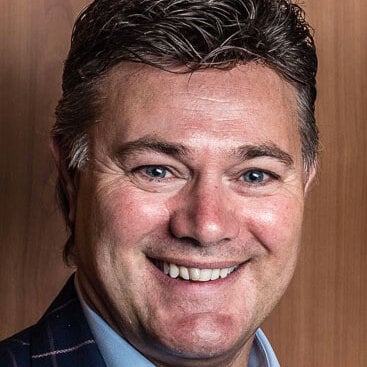May 01 2024 / Round the Table Magazine
Write your way to being the expert
Topics Covered
As the financial services arena becomes increasingly competitive, advisors who position themselves as experts can gain a foothold in the market. One way to burnish a reputation for mastery is to write a book. That book may not ever crack the bestsellers list, but it can be a powerful marketing tool.
The motivation for Michael W. Hanna, CFP, RICP, for writing “Get Your Money Right” was to document the advice he had been telling clients for years. So, the 10-year MDRT member from New York, New York, USA, outlined a table of contents and spent two years writing chapters — essentially his “greatest hits of essential financial understanding” — from his kitchen counter and during downtimes on his travels.
“After thousands of conversations, you realize you’re hitting on the same points or the same areas with a lot of people, so I just wanted to have it documented somewhere, so people can listen to it on their way to work, read it, or to give it to their family and friends,” he said.
The book is one cog in a marketing regimen that includes his website, social media and podcast, as he gives it to clients and to prospects who have onboarded. He doesn’t track exactly from where a prospect comes, but he does encounter anecdotes that validate the book is working.
“It’s something that people talk to other people about, and that’s helpful,” Hanna said. “I had a client who had the book, and she came to a happy hour event that another client hosted and said, ‘Let’s get your book out. I’m going to have people from my bar association come for drinks.’ So, we did that. We rented a room and bought copies of the book. One of my other clients showed up and said that she didn’t know I had a book. So, we did a book happy hour with her some months later.”
Ralph Antolino Jr., J.D., CLU, is the author of three books, including “Bon Voyage: The Nine Secrets of the Ultra-Happy,” which is about the attitudes and habits of people who choose to be happy rather than let their wants dominate their lives. Business owner clients have ordered the book for their employees, and the 42-year MDRT member from Columbus, Ohio, USA, gives it to prospects and new clients before jumping into the weeds of tax savings, financial planning and insurance. It’s a way to introduce them to how the firm can help them look beyond money and achieve ultra happiness.
“It’s a tool for teaching prospects about who we are and how we think from a philosophical point of view regarding what they should get out of working with us,” he said.
His third and just-released work, “Is My Money OK?” is an outreach to educate and perhaps attract do-it-yourselfers. It reveals his firm’s branded process to help people determine what they want and the road map for making financial decisions.
“We’ve had a lot of clients who tried to do financial planning themselves and realized they couldn’t do it,” Antolino said. “This book is about if you want to do it yourself, here’s how you do it. If you don’t want to do it, or you’re trying it yourself and want some help, we’re available. My hope is this collection of titles clarifies the way our firm thinks and what we do and that it communicates to the world that we are worthy of a conversation.”
Get published, get noticed
Charlie Reading, APFS, a six-year MDRT member from Rutland, England, UK, made more than
£1 million from his first book, “The Dream Retirement” but not from book sales. That revenue came from the clients the book attracted to his business. That’s why he gives copies away for free.
“While you must put a price on the back of the book, you should just give it to your ideal clients,” he explained. “You won’t make money selling books; you make money from the fees those future clients generate.”
Reading has published multiple books on financial literacy and has developed his own guide for advisors looking to get published:
- Start with a digital mind map — a brainstorming tool commonly used in project planning — and divide your book into logical chapters. “This will really help, because as you write the book, you’ll want to shift concepts around as new ideas emerge,” he said.
- Identify common concerns from clients, and pick a title that highlights the struggles they face or the destination they hope to reach.
- Next, create two lists: one with stories you love to tell, and people love to hear, and another with topics you want to cover.
- Make a list of common questions clients ask and a list of questions they should be asking.
“Put a photo of yourself on the cover or at least inside,” Reading added. “You want your readers to connect with you as much as possible, and this will help.”
If the idea of finding a publisher sounds daunting, Reading advises bypassing traditional outlets and publish it yourself.
“I had ‘Entrepreneurial Happiness’ published by a traditional publisher, and wish I hadn’t,” Reading said. “You are better to self-publish a business book, as this gives you speed and control, and you can amend future versions as you wish. We’ve found Amazon works well here.”
Aim for somewhere between 30,000 and 60,000 words, and schedule time to regularly focus on writing. “Each writing session, you’ll know exactly what to write from your mind map, topic questions and list of stories,” Reading said.
Tips for promoting
- Provide something in the book for potential clients to download in exchange for their email address. Then, send them an automated stream of value-add emails over the next several months.
- Offer free copies of the digital version of the book on the website in exchange for an email address.
- Host a book launch party, take lots of photos and use them to market yourself as an expert.
- Promote the book by gifting it to prospects at every opportunity. It will position you as an expert and bring in new leads.
“This book is primarily about making you the expert,” he said. “A book is your best business card because whether or not it’s read, prospects are far less likely to throw it away.”
The expert and the author
Specializing in a niche and writing about it can have a compounding effect. Karl Hartey, a 29-year MDRT member from Oswestry, England, UK, focused on pensions, divorce and financial settlements and wrote a book about those topics. It was difficult to market at first, but his efforts eventually paid off through one high-profile client.
One day, a contact told him the son of one of his clients, the mother of a well-known politician, was getting divorced. He asked Hartey for a copy of his book to give her. The mother called the next morning to thank him for the book and scheduled an appointment. That meeting resulted in Hartey adding £10 million of business during the next few years.
“The power of a book is that it brings credibility,” he said. “To be a published author in your field provides status against the competition. You become the expert, and it gives the client confidence.”
The success of self-publishing motivated Hartey to create the “All You Need to Know About…” book series highlighting such topics as retirement, long-term care, and tax and estate planning. Hartey and his colleagues send another book “Securing Your Family’s Financial Future: 60 Top Tips” to their top 100 clients about a month before Christmas and ask if they’d like extra copies to give as gifts.
“We had about 20 requests for books, which were sent out over the next six months, and those books brought in 10 new clients,” he said.










![Four essential things financial advisors in India should do to grow their skills [Deepak Agrawal]](https://members.preprod.mdrt.org/globalassets/digizuite/33706-en-india_written-interview_deepak_agarwal_thumbnails.png?height=268&width=268&mode=crop)

![The role of insurance in estate planning in India [Mathew P. Joseph]](https://members.preprod.mdrt.org/globalassets/digizuite/33576-en-india_written-interview_mathew-joseph_thumbnails.png?height=268&width=268&mode=crop)
